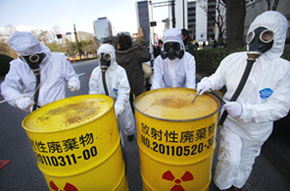 | ■ International
Hoping for a non-nuclear Japan
希望日本非核化
Tens of thousands stage an anti-nuclear power rally in Tokyo
成千上萬人參加東京舉行的反核集會 |
| Tens of thousands of people turned out for an anti-nuclear rally in Tokyo on Sunday ahead of the third anniversary of the Fukushima disaster. Demonstrators congregated at Hibiya Park, close to central government buildings, before marching around the national parliament. They gathered to voice their anger at the nuclear industry and the government of Prime Minister Shinzo Abe, who has called for the resumption of nuclear reactors to power the world's third-largest economy. | 在福島核災三周年前夕,成千上萬人參加一場在東京舉行的反核集會。示威者聚集在中央政府大樓附近的日比谷公園,然後在國會周圍遊行。他們聚集在一起表達對核能業與首相安倍晉三政府的憤怒,安倍曾呼籲讓核子反應爐重新運轉,以驅動日本這個全球第三大的經濟體。 |
| "I felt it's important that we continue to raise our voices whenever possible," said Yasuro Kawai, a 66-year-old businessman from Chiba prefecture, east of Tokyo. "Today, there is no electricity flowing in Japan that is made at nuclear plants. If we continue this zero nuclear status and if we make efforts to promote renewable energy and invest in energy-saving technology, I think it's possible to live without nuclear power," Kawai said. | 位於東京都東方的六十六歲千葉縣商人河合康郎(音譯)表示:「我認為一有機會就繼續發聲很重要。現在全日本傳輸的電力,都不是核電廠製造的。」他指出:「假若我們繼續維持這樣的零核狀態,而且努力推動再生能源,並投資節能科技的話,我認為就算沒有核電,也還是可以過活。」 |
| On Tuesday, Japan marked the anniversary of the deadly 9.0-magnitude earthquake that hit the northern region on March 11, 2011, prompting a killer tsunami that swept the northern Pacific coastline. The natural disasters killed 15,884 people and left 2,636 people still unaccounted for. Huge waves swamped cooling systems at the Fukushima plant, which went through reactor meltdowns and explosions that spewed radioactive materials over the vast farm region. The plant remains volatile and engineers say it will take four decades to dismantle the crippled reactors. | 日本週二紀念二○一一年三月十一日侵襲該國北部,並隨即席捲北太平洋沿海的芮氏規模九點零致命強震及海嘯。這兩起天災共造成一萬五千八百八十四人喪生,另外有兩千六百卅六人下落不明。巨浪淹沒了福島核電廠的冷卻系統,而該電廠先前發生反應爐熔毀及爆炸,導致輻射物質被噴灑到當地廣大農業區的意外。該核電廠的狀況依舊不穩定,而工程師表示,拆除受損的反應爐將需要四十年的時間。 |
| Protesters in Tokyo stressed that Japan can live without nuclear power, as it has done so for many months while all of the nation's 50 commercial nuclear reactors have remained offline due to tense public opposition to restarting them. In a lighthearted approach to get their message heard, musicians performed using electricity generated by huge solar panels at the park. | 東京的示威者強調,日本五十個商用核子反應爐在民眾強烈反對讓它們重啟而依舊停止運轉的情況下,日本可以不靠核能生活。音樂家在日比谷公園表演時,使用大型太陽能板產生的電力,以詼諧的方式傳達自己的訴求。 |
| The rally featured stars like composer Ryuichi Sakamoto, who played music he created three years ago to mourn the victims of the disasters. Although no one died as a direct result of the atomic accident, at least 1,656 Fukushima residents have died due to complications related to stress and other conditions while their lives in evacuation become extended. | 作曲家坂本龍一演奏了他三年前為了哀悼三一一災變的受害者而創作的曲子。雖然沒有人直接因為核子意外而喪生,有至少一千六百五十六名福島居民卻因為撤離家園的生活延長,死於壓力與其他狀況引發的併發症。 |
| Tokyo resident Michiko Sasaki, 80, said Japan's national priority should be to think about how to end its use of nuclear power and to rebuild the northern region hit by the disaster. "In this small nation of ours, there are so many nuclear plants. We are prone to earthquakes," she added. "If we don't end it now, what will happen in the future?" she asked. | 八十歲的東京居民佐佐木美智子(音譯)表示,日本的首要國家目標應該是思考如何終止使用核能,並重建受到重創的北部地區。她接著指出:「在我們這個小小的國家,核電廠有這麼多座,而日本又是經常發生地震的地方。」她問道:「假如我們現在不終結核能的話,未來會發生什麼事?」 |
沒有留言:
張貼留言